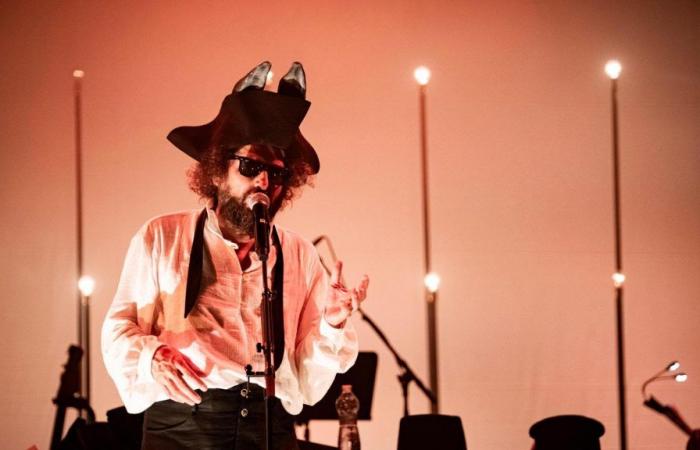He seems like a slightly extravagant character from some gothic fairy tale: the look of an existentialist navigator in search of new horizons to reveal, a sweet but restless look that sees art and poetry even where others only see banal everyday life, a type of slow verbal communication , thought out and weighed, in which the pauses and sighs count as much as the words that follow. Vinicio Capossela is a singer-songwriter who has always followed his own language even in music, which is difficult to categorize: there is folk, pop, blues, jazz, tango and much more. Yet his songs are now accepted even among those who prefer catchphrases to torment, as demonstrated by the sensational case of “Che coss’è l’amor”, whose enthralling rhythm has punctuated both films and commercials over the years. The song is part of an album, “Camera a sud”, which turns thirty this year and which will be played in its entirety on Monday at Villa Arconati (sold out) with a special extended lineup.
Capossela, how do you experience the anniversaries of your records? Does it make you happy or melancholy?
«They’re like birthdays, you don’t celebrate age, but the fact of having come into the world. Naturally, an album like this could be performed in its entirety every year, but since it has generated affection around it, it seemed nice to me to take the opportunity to perform it with a lineup that would allow us to enhance the beauty of the arrangements, created by Antonio Marangolo, who however unfortunately he won’t be at Villa Arconati.”
Is “Camera a sud” an album in which you still see yourself today?
“Yes, they are songs that continue to speak to me. Music is an access to mythical time and in fact many of those pieces contain the word time. It’s a record in which there are seeds that then germinated.”
Is it his best album?
«It’s difficult to say, it has entered people’s hearts, it’s the “Che coss’è l’amor” album, which I’m fond of. But I don’t know if it’s the most beautiful.”
To quote her most famous song, what is love to her?
«“Camera a sud” represents the crossing of a shadow line, as Conrad said. It is a love not only evoked or regretted, because the songs were born while things were happening. It is like a heart open to all the fragilities and possibilities, the abysses and fears of love when it crosses borders. Love is awareness of one’s own limit. The album is about this limit».
Vecchioni said he got a little tired of always playing “Samarcanda”. What is your relationship with “Che coss’è l’amor”?
“I have no problem with the song, also because I don’t play it many times. But when I perform it live I enjoy it.”
Are you surprised that it has become such a popular piece?
«I would like to point out that it also tells of not so cheerful events: the verse “If this is misery I will dive into it with dignity as a king” is a manifesto of life. But the funny thing is something else».
Tell me.
«At the time we hadn’t even chosen it as a single, we hadn’t bet on it».
It cannot be said that he had far-sighted ideas.
“There are some pieces that take their own path. This piece has become a bit of everyone’s, for me it’s very personal and it recalls a specific period of my life, but in the end it has become universal.”
If it were released today, how would the album be received in your opinion?
«When it came out, in the mid-nineties, it wasn’t the result of its times, but it was already something in itself, a classic, as far as a similar term in song form is worth. Even if “Southern Room” were released today it would be… out of class, out of place. It wouldn’t be in line with the times, but classics are classics because they have universal themes.”
But how do you find yourself in the current recording market?
“I grew up in a world where playing live was fundamental. I have the feeling that now much of one’s path is entrusted to technological mediation, therefore to the image more than to knowing how to be on stage. For me, personality is essential, but it doesn’t seem like that anymore. Maybe someone gets millions of views and has found himself in front of an audience three times.”
Will you tell any anecdotes during the Villa Arconati concert?
«The album contains real life episodes, like when your friends start getting married, you go to be the best man and give false testimony at unlikely hours in the morning. You look around, you see that the others are already divorced…”.
You refer to the song “My ungrateful friend”. But how did the person to whom it is dedicated react?
«My ungrateful friend took it very well because he had to play it every evening, he is the double bass player Enrico Lazzarini».
And Milan? Does it somehow enter into the narrative of “Camera a sud”?
«It was recorded in Bologna, but it was largely written in Milan, where I moved in ’93. Let’s say that it was the location of the events, even if it doesn’t appear explicitly. By now I have settled near the Central station, towards Via Benedetto Marcello, a slice of life where there is space for every gradation and degradation, therefore a good observation point on the world. I’ve always wanted to have a neighborhood as an idea and I think I’ve found it. And then my compass is tram 1.”






